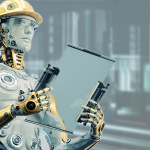 When we talk about AI in the workplace, the conversations are often framed in a destructive sense. Robots will take our jobs, that kind of thing. There’s a growing consensus that we need to be much more nuanced however, and accept that AI will change our jobs rather than replace them, that we will need to reengineer our work so that humans do what humans do best, and machines what machines do best.
When we talk about AI in the workplace, the conversations are often framed in a destructive sense. Robots will take our jobs, that kind of thing. There’s a growing consensus that we need to be much more nuanced however, and accept that AI will change our jobs rather than replace them, that we will need to reengineer our work so that humans do what humans do best, and machines what machines do best.
This fusion of man and machine working alongside one another was emphasized nicely by a recent study published by California Polytechnic State University, which examined how effective AI can be at fostering teamwork within a group.
The study showed that when AI was used to encourage collaboration, the group began developing a ‘hive mind’ and was subsequently able to achieve higher accuracy scores on standard intelligence tests than when each individual worked alone.
Developing a hive mind
The study asked volunteers to group into 60 small teams and complete a standard social intelligence test, known as “Reading the Mind in the Eyes” (RME). It’s widely believed to be a strong gauge of the effectiveness of a team, and indeed the collective intelligence of the group.
When the volunteers were tested individually, they were able to achieve an accuracy score of around 68% on the test. When they were paired with an AI-based technology however, this leaped to 85%. What’s more, the average AI-supported team outperformed 93% of individuals.
“This is an exciting result,” the researchers say. “It suggests that business teams can be significantly more effective at making group decisions if they work together, connected by Swarm AI algorithms.”
The kind of ‘swarm AI’ technology used in the experiment was effective because it was able to connect distributed human teams into the kind of intelligent systems seen in nature, in for instance, swarms of birds. The team believe it helps to create a ‘hive mind’, which is moderated by the AI technology to allow the combined wisdom of the group to emerge.
“When it comes to decision-making technologies, most uses of AI are aimed at replacing people with algorithms,” the researchers explain. “What is most exciting about this study is that we’re not replacing people – we’re keeping them in the loop, using AI to optimize their knowledge, wisdom, and collective intelligence in real-time.”
More research is being undertaken to test the technology further, but it’s an indication of how AI can play a fascinating role in making our teams smarter and more effective.